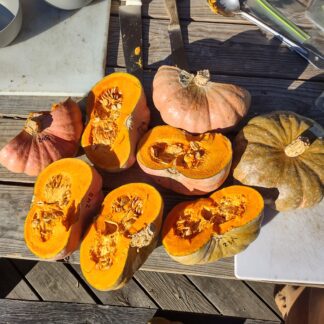Additional information
| Size | 15 Seeds (packet) |
|---|
$4.50
Grown by Twin Oaks Seed Farm, breeding led by Edmund Frost – Cucurbita maxima – 110 days
Moschata winter squash (the species that includes butternut and most tropical pumpkins), tends to work better than the other squash species in the Southeast U.S. Moschata eating quality can be excellent – rich, sweet, nutty, aromatic and more. But there is a kind of bright, dry, chestnut flavor present in the best maxima species squash that moschatas just don’t cover. This breeding project is about making it easy to grow that kind of squash in our climate. The problems maximas encounter here include vine borers, bacterial wilt, sunburn, extra attractiveness to insects, and overall poor adaptation to heat. In 2018 Edmund trialed Moranga Coroa, a maxima squash from Brazil, and found that it grew well and wasn’t susceptible to vine borers. However the flavor of Moranga Coroa is not very sweet or notable in the ways we expect from a dessert squash. So the next step was to cross Moranga Coroa with something with dessert quality flavor. We went with Winter Sweet Kabocha from Johnny’s. We’ve been selecting since then for vines that the borers don’t get into, for generally strong and long-lasting plants, and of course for great flavor. Coming into 2024 we had made good progress on all those fronts, but the problem was that the eating quality was inconsistent: about half the plants made great quality squash and about half the plants made bland squash. In 2024 we attempted to self pollinate each of about 24 plants, and succeeded with about 2/3 of them. This research sample includes self-pollinated seeds from the best tasting plants. We expect this will get rid of the lingering bland-tasting genetics. The squash are mostly oblate, with weights that range from about 2 to 6 pounds, and color ranging from light grey to dark grey, with some blue and pink hues mixed in. They are attractive and tend to be excellent keepers – it might be the best keeping squash we have. Expect about 60% of plants to be free of vine borers; plants that do get vine borers generally survive as well because they root vigorously at the nodes.
These seeds and their offspring are open-source and not available for private intellectual property ownership. Pass these words on when you pass the seeds on!
| Size | 15 Seeds (packet) |
|---|
